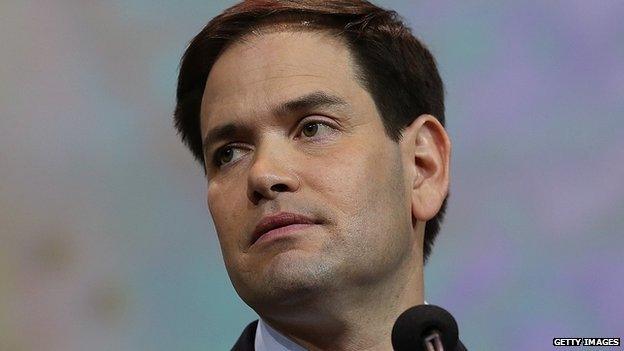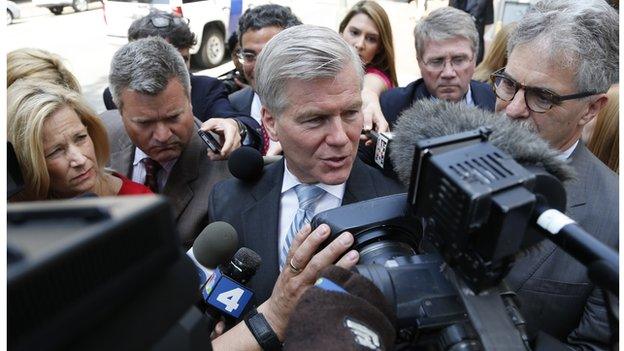2016 US election: Do Marco Rubio's money troubles matter?
- Published

If you're like many Americans, you're probably struggling with a home mortgage (or two), student loans and credit card debt. Perhaps you're one of the millions who has missed a mortgage payment (or two) on a home and flirted with foreclosure.
What would you do with a financial windfall in the neighbourhood of $800,000?
Maybe you'd pay off those burdensome debts. Maybe you'd splurge on a big-ticket luxury item.
If you were Florida Senator Marco Rubio, you did both.
When he landed a high six-figure book deal in 2012, according to, external the New York Times, the presidential hopeful paid off some of his law school loans - but he also bought an $80,000 24-foot boat and leased a $50,000 Audi Q7.
The paper on Tuesday detailed the candidate's up-and-down financial history, including selling a nearly foreclosed upon second home for a loss and incurring Internal Revenue Service penalties after cashing in a $68,000 pre-tax retirement account. It also noted how he used Republican Party and campaign funds for personal expenses and neglected to pay government fees.
Times reporters Steve Eder and Michael Barbaro suggest that episodes like this raise "persistent doubts" and "particular complications" around Mr Rubio's finances, drawing contrast to his calls on the campaign trail for government austerity and budget restraint.
They note that Mitt Romney's 2012 Republican presidential campaign considered Mr Rubio as a possible vice-presidential pick, but was concerned about the senator's finances.

The Times quotes Mr Rubio defending his actions.
"Like most Americans, I know what it's like for money to be a limited resource and to have to manage it accordingly," he said. "Our primary financial motivation over the last 15 years has not been to become wealthy. It has been to provide for our children a happy upbringing and the chance at a great future."
The implication of the Times article is that Mr Rubio's financial concerns are a black mark against him - whether it makes him more susceptible to corruption or just less competent were he to be elected president.
"It has made him unusually reliant on a campaign donor, Norman Braman, a billionaire who subsidised Mr Rubio's job as a college instructor, hired him as lawyer and continues to employ his wife," the Times reporters write.
Recent political history certainly provides evidence that money troubles can become political and legal scandals for officials who may be, shall we say, ethically challenged.
Former Virginia Governor Bob McDonnell and his wife were convicted last year of public corruption for accepting gifts and loans in exchange for public acts. Their troubled financial history was on full display during the trial, including difficulties making mortgage payments and excessive credit card debt.

Former Virginia Governor Bob McDonnell was sentenced to two years in prison for public corruption
New Jersey Senator Robert Menendez has also faced bribery questions, as he was indicted in April on federal corruption charges - using his office, according to prosecutors, to "benefit and enrich" himself. He denies the charges.
In Mr Rubio's case, of course, there's no indication of malfeasance. Just, possibly, poor money management. Just, very likely, similar to the experiences of many of the Americans who might end up voting for him in the Republican primaries and, if he's fortunate, the general election.
So what's more appealing to the public? A candidate who comes from wealth (Jeb Bush, for instance) or has acquired vast amounts of it (Hillary Clinton)? Or a candidate who's not that far removed from his own money struggles?
There's a bit of conventional wisdom that Americans end up voting for the candidate that they'd most like to have a beer with. They're less concerned with whether the candidate can afford just one round or could pay cash for an entire brewery.
Following the article's publication, Rubio spokesman Alex Conant made the obvious play, also bringing up an earlier Times story about his candidate's driving record.
"First the New York Times attacked Marco over traffic tickets, and now they think he doesn't have enough money," he wrote, external on the campaign website. "Of course if he was worth millions, the Times would then attack him for being too rich, like they did to Mitt Romney."
Conservative commentators have joined on the Times-bashing, offering pictures of Mr Rubio's rather modest looking, external "luxury speedboat" and noting, external that anyone, like Mr Rubio, who pays for four children to go to private religious school is going to have trouble saving money.
Of course it wasn't too long ago that conservatives were trumpeting Times articles critical of Hillary Clinton's personal finances, including the activities of her nonprofit foundation, while liberals were busy accusing the paper of bias.
Anthony talks presidential politics with columnist Jamie Stiehm
Even those on the left seem to be a little less than impressed with the Rubio allegations, however.
Slate's Jamelle Bouie says that Mr Rubio's financial struggles are understandable.
"Given Rubio's background - working-class parents with little in the way of cash reserves - I'm not shocked he isn't great at managing money," he tweets, external. "Ask anyone who grew up in those circumstances but came into healthy incomes as an adult: It's hard to know what to do."
The Rubio campaign seems to know what to do now, however - turn Mr Rubio's lack of money into a fundraising windfall. Its website features a page, external asking supporters to sign a petition "to let the liberal media know you won't be swayed by their attacks on strong conservatives like Marco".
As Brendan Buck, a congressional staffer for 2012 Republican vice-presidential nominee Paul Ryan, quipped, external: "Every other Republican candidate is wondering what they can do to get the New York Times to pick on them."
Republican candidates in - and out - of the 2016 presidential race
